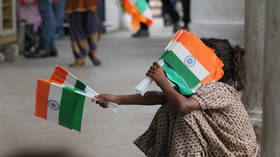US knows best? Washington threatens India with sanctions over citizenship bill for persecuted religious minorities

The US has decided to give India its foreign take on the country’s hotly debated citizenship bill, threatening Indian government officials with sanctions for failing to list Muslims among ‘persecuted’ minorities.
The US Commission on International Religious Freedom (USCIRF) claimed it was “deeply troubled” by the citizenship bill, which passed the Indian parliament’s lower house, the Lok Sabha, in a 311-80 vote, calling it nothing short of a “religious test for Indian citizenship” which “excludes Muslims.”
“The United States government should consider sanctions against the home minister and other principal leadership” if the bill passes, the commission said, insisting that it knows how Indian internal politics works best.
Dubbed the Citizenship Amendment Bill, or CAB for short, the new law will fast-track Indian citizenship for immigrants facing religious discrimination in several neighboring countries.
Also on rt.com India should not be ‘bullied’ on world stage: Iran’s FM Zarif calls on New Delhi to resist US pressureWhile the bill specifies Hindus, Sikhs, Buddhists, Jains, Parsis and Christians, it makes no mention of Muslims, an omission that has courted controversy. As the lower house debated on Monday, opposition lawmakers slammed the bill as “divisive” and deemed it “targeted legislation” that seeks to strip rights from Muslim minorities.
However, Home Minister Amit Shah, who introduced the law, outright rejected the US butting into India's internal affairs, insisting the bill is solely intended to protect those facing persecution.
“In Afghanistan, Pakistan and Bangladesh, Hindus, Sikhs, Buddhists, Christians, Parsis and Jains have been discriminated against,” Shah shot back. “So this Bill will give these persecuted people citizenship.”
If any Muslim from these three nations applies for citizenship according to our law, then we will consider it, but the person won’t get the benefit of this amendment as the person has not faced religious persecution.
The bill also has backing from Indian Prime Minister Narendra Modi, who, like Shah, belongs to the ruling Bharatiya Janata Party (BJP).
Also on rt.com In swipe at US, New Delhi says foreign nations must ‘respect’ its decision to purchase Russian S-400 systemsThe USCIRF was established in 1998 to monitor and evaluate religious freedoms in other countries and to make policy recommendations to the US president, the State Department and the House of Representatives – routinely calling for sanctions against those who don’t live up to American standards. The commission placed India on a “watch list” in 2009 over what it said were “largely inadequate” protections for minorities. However, New Delhi has barred entry for American commissioners attempting to travel to the country, insisting they stay out of the country’s internal affairs.
Like this story? Share it with a friend!














